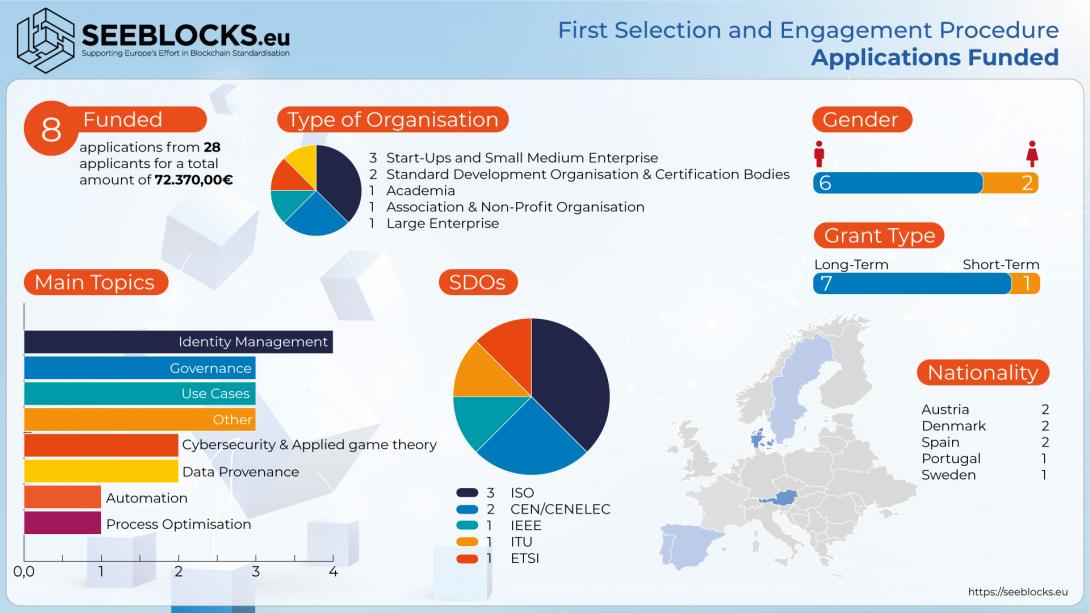Get to know the Blockchain topics the First Pool of SEEBLOCKS.eu Experts are sinking their teeth into
9 April 2024

SEEBLOCKS is excited to announce that contracts have now been signed by the recipients of more than seventy-thousand Euros of funding under our first Selection and Engagement Procedure (SEP). Eight experts selected from a total of 28 submitted applications will now be working over the coming months on Blockchain / Distributed Ledger Technologies (DLT) standardisation activities.
The pool of applications reflected a broad set of interests, organisations, and geographical locations. Austria, Denmark, and Spain dominated the submissions, with start-ups and SMEs most represented. The large international and European standards developing organisations ISO and CEN/CENELEC were targeted by well over half of the applications for standardisation activities, with identity management and governance as the topics most often addressed.
Our experts are almost exclusively working on our long-term form contracts – those which can last up to six months, giving the expert a sufficient period of time to initiate and bring to conclusion activities that can achieve significant impact in Blockchain/DLT standardisation.
Multiple Blockchain/DLT topics being addressed to improve numerous fields
The topics chosen by our experts are some of the most challenging but potentially rewarding today. For example, some important industries such as robotics could be well served by stable, standardised Blockchain services. Consider a group of autonomous, communicating robots carrying out a complex task together. Armed with a standardised way to capture and package their independently gathered knowledge in smart contracts, they could communicate much more effectively and reliably. One of our experts is surveying the state of the art here.
The Public Key Infrastructure (PKI) is the backbone of reliable and secure communication in critical sectors such as banking, health, and e-government. Countries around the world have successfully established trustworthy PKI domains, but there is an increasing need for a worldwide set of interconnected PKI domains that can establish a “global trust domain”. One of our experts will be examining how Blockchain technology might be employed to establish a decentralised PKI.
The establishment of a Europe-wide digital identity is one of the ways in which the European Commission seeks to improve the lives of its citizens. But at the heart of this initiative is a whole series of needed standards to establish formats for services such as the Mobile Drivers License and digital attestations. There’s an expert also for that in our first Selection and Engagement Procedure.
Bitcoin and its cousins have had their ups and downs over the years, but this hasn’t obscured the vision of introducing trustworthy, reliable digital currencies. An important prerequisite, however, is a stable, agreed vocabulary that permits discussion and progress in this area among the many different stakeholders, from regulators to bankers to consumers. A SEEBLOCKS SEP expert is addressing this topic.
Another of our experts will be trying to consolidate the current set of disparate, fragmented initiatives for processing and protecting personal data using Blockchain / DLT into a coherent, harmonised set of guidelines and best practices. Researchers and practitioners will be able to utilize these results to move the state of the art forward in a systematic manner and avoid the inevitable pitfalls of interoperability, misuse, and security breaches that would otherwise emerge.
At the very heart of Blockchain / DLT is decentralisation. It not only can lead to new forms of currency and digital identity, but also to new forms of governance, such as the Distributed Autonomous Organisation (DAO), with many ensuing benefits such as increased agility and greater administrative efficiency. Here, too, there remains much to do before achieving this objective. One of our experts will be analysing today’s reality with an aim to consolidate a potential scenario for a harmonised framework that could be the basis of a first European Trust Registry for DAOs.
A final example concerns one of the most critical challenges of all: our environment. The infamous “proof of work” consensus mechanism of Bitcoin has been roundly criticised in the worldwide press as being environmentally harmful, and the Blockchain community is responding with more sustainable techniques. But the lack of a standardised methodology to evaluate them based on their environmental footprint has hindered the emergence of a systematic approach to this important problem. We have an expert looking carefully at this issue, whereby another one of our experts will be addressing a related issue in the battle to save our environment: the much-publicised concept of carbon credits. Blockchain offers an excellent solution to regulate carbon credit transactions and their allocation, and improve carbon offset project management. But here, too, much standardisation remains to be completed, from carbon calculation to carbon market methodologies, before an effective, well-functioning system can be operational.
Future “Experts on the block” being selected
The Second Selection and Engagement Procedure (SEP2) is already under evaluation and we look forward to telling you, from early May, about the exciting challenges in Blockchain / SEP standardisation that our next group of experts will be addressing soon.